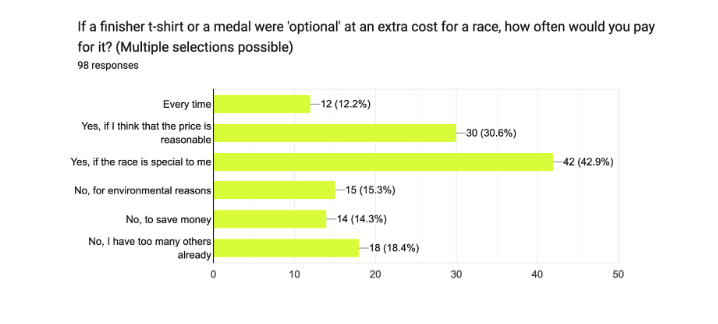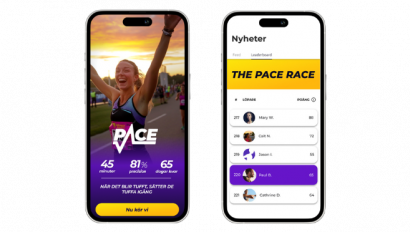Should You Make Finisher T-Shirts and Medals Optional For Your Race?

The environment and sustainability in events are hot topics, and important to consider when you plan your race. Whether your race is large or small, there are a number of ways in which you can reduce the impact on the environment.
One option that is becoming popular related to this topic, is to skip offering medals and/or finisher t-shirts at your race, or alternatively, offer them for an additional charge to the participants that really want them.
We have seen a few races opting for these ways to work, as you can reduce both costs and environmental impact by producing and shipping less material. At the same time, these small items add a lot of value to the race experience for many participants. In this article, we give you the pros and cons of skipping medals and t-shirts in your race package.
Advantages of Not Offering Medals/T-Shirts
-
Save money
By making the items optional, you can produce fewer items, reducing the cost of production and materials which can make a big difference on the bottom line. By reducing costs, you can increase the profit margins and potentially reinvest the savings into future events or other areas of the experience such as improving the overall event experience or increasing participant safety for example.
-
Minimize waste & carbon footprint
By not producing a t-shirt or medal for every participant, you can minimize the amount of waste generated. Sometimes, participants will throw away unused t-shirts and medals shortly after the race, making these items a strain on the environment due to their short life length.
By reducing the production of these items, you also reduce emissions associated with transportation and shipping, all in all reducing the carbon footprint of your race. (Calculate your carbon footprint here!)
-
Increased participant choice & experience
Participants who don’t value or have no need for a finisher t-shirt or medal can opt out, increasing their satisfaction and potentially increasing their likelihood to return to future events because they like your approach. Depending on how you communicate the options, you will also help your sustainability image as a brand.
Disadvantages of Not Offering Medals/T-Shirts
-
Not fulfilling participant expectations
Offering finisher items can be a way for you to provide a memorable and tangible experience for your participants. A medal can be hung up on the wall and be admired for years to come, reminding the participant about the great experience they had. The same is valid for finisher t-shirts – many athletes keep them as a memory and collect them from each race they participate in. Many particpants expect the medal and finisher t-shirt to be included in the race fee. If you leave it out or make them pay extra for it, you can create a sense of disappointment in them.
In a participant survey from the RaceID platform, participants stated the finisher t-shirt as adding the most value as an “extra” item for a race:

Graph from RaceID participant preferences survey.
-
Loss of marketing space & opportunities
Medals and finisher t-shirts are an excellent space for marketing and visibility of your logo and race name. It is also a space to offer sponsorship prints that can be highly valuable to your race in terms of extra income. Skipping out on giving each racer a medal and a t-shirt will definitely cut down on how much you can spread the word about your race afterward.
Conclusion – Should You Make Finisher T-Shirts And Medals Optional For Your Race?
It’s important to carefully weigh the pros and cons of making medals or finisher t-shirts optional before you decide what to do for your race. Ultimately, it is down to your preferences. You can also consider alternative options such as reducing the number of items produced in different ways, sourcing materials more efficiently and sustainably, or offering lower-cost alternatives. If you decide to let participants opt-out, it is also important to plan how to communicate this in conjunction with your registration so it is clear why it is optional.
To help you further decide, we will finish this discussion with a result from a recent survey on participant preferences – it is clear that participants are okay with paying for these items if the race is important to them:

Not convinced? Check here for 5 other ways you can make your race more sustainable.
Cover photo: Hermanövarvet


